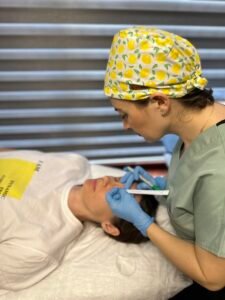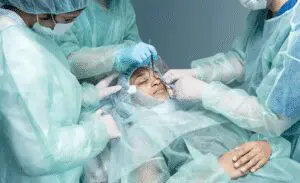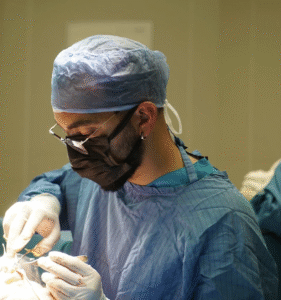Distortion of the nasal septum: how a hidden problem destroys health
A deviated nasal septum is a common problem that many people are unaware of. This condition can be either congenital or acquired due to trauma, but its impact on health is often underestimated. In this article, we will discuss how a deviated septum affects the body, what consequences it can cause, and why it is important to address this issue in a timely manner. We will also explore the possibility of combining septoplasty with rhinoplasty and explain why Turkey is becoming a leader in the field of plastic surgery.
What is a Deviated Nasal Septum?

The nasal septum is a cartilaginous and bony structure that divides the nasal cavity into two parts. Ideally, it should be straight, allowing for an even airflow through both nostrils. However, for most people, the septum is deviated to some extent. Sometimes this deviation is minimal and does not cause problems, but in some cases, it can significantly affect breathing and overall health.
Why Are Many Unaware of the Problem?
Many people live with a deviated nasal septum without realizing that it is affecting their health. Symptoms may be subtle or develop gradually, so the issue is often perceived as something minor or related to other factors.
Here are a few reasons why the problem goes unnoticed:
- Gradual Adaptation: The body adjusts to the discomfort, and a person simply stops noticing the deterioration in their breathing.
- Masking Symptoms: Chronic nasal congestion, frequent colds, or allergies can hide the true cause of the nasal blockage.
- Lack of Pronounced Signs: Some people may have a deviated septum without significant symptoms until it becomes more serious.
What Are the Consequences of a Deviated Nasal Septum?
A deviated septum is not just a cosmetic problem. It can significantly impact various aspects of health:
- Chronic Nasal Congestion: The deviation reduces ventilation in the nasal cavity, leading to persistent congestion.
- Frequent Infections: Impaired airflow creates an environment conducive to infections like sinusitis.
- Snoring and Sleep Apnea: A deviated septum often causes snoring and obstructive sleep apnea syndrome.
- Headaches: Pressure in the nose and forehead area can cause headaches and discomfort.
- Reduced Quality of Life: Constant fatigue, difficulty breathing, and reduced oxygen levels in the blood negatively impact overall well-being.
- Problems with the Oral Cavity and Jaw Area
Impact on Teeth and Jaw
A deviated nasal septum can also affect dental health for several reasons:
- Mouth Breathing: Constant mouth breathing dries out the mucous membrane and creates conditions for tooth decay and gum disease. The lack of protective saliva increases the risk of bacterial growth.
- Improper Jaw Development in Children: Children with chronic mouth breathing may develop malocclusion and jaw deformities. This is linked to insufficient nasal breathing affecting the development of the upper jaw.
- Bruxism and Jaw Muscle Tension: Oxygen deprivation and chronic discomfort can lead to jaw muscle tension, which may contribute to tooth wear and temporomandibular joint dysfunction.
Why Is It Important to Address the Problem in a Timely Manner?
Ignoring the issue can lead to worsening symptoms and the development of complications. The sooner the diagnosis and treatment are made, the easier it is to restore normal breathing and prevent negative health consequences.
The solution is most often surgical correction – septoplasty. This procedure is aimed at straightening the septum and restoring normal breathing.
Combining Septoplasty and Rhinoplasty
For many patients, a deviated septum is accompanied by aesthetic issues – an irregular shape or asymmetry of the nose. In such cases, doctors offer a combination of two procedures:
- Septoplasty: Restoration of nasal functionality.
- Rhinoplasty: Correction of the external appearance of the nose.
This approach not only improves health but also achieves an aesthetically harmonious result. Performing both surgeries simultaneously reduces the overall recovery time and minimizes stress for the patient.
For more information about rhinoplasty, its types, and rehabilitation process, you can read more here.
You can also view the “before” and “after” results of the procedure on our Instagram.
Rhinoplasty in Turkey: Quality and Affordability
Turkey confidently holds leading positions in the plastic surgery market. Every year, thousands of patients come here seeking high-quality and affordable treatment.
Reasons for the popularity of rhinoplasty in Turkey include:
- Experienced Surgeons: Turkish specialists have high qualifications and many years of experience.
- Modern Technologies: The latest methods and equipment are used to minimize risks and achieve natural results.
- Affordable Prices: The cost of procedures in Turkey is significantly lower than in Europe and the USA, making treatment more accessible.
- Comprehensive Service Packages: Many clinics offer “all-inclusive” packages – surgery, accommodation, transfer, and translation services.
- Medical Tourism: Patients can combine treatment with a vacation in one of the most beautiful corners of the world.
Conclusion
A deviated nasal septum is an issue that can significantly affect quality of life. Timely resolution, including septoplasty and possible rhinoplasty, helps restore breathing and improve appearance.
Thanks to a high level of medical services and affordable prices, Turkey is becoming the ideal choice for those seeking quality and reliable treatment. If you suspect you have a deviated septum or want to learn more about the possibilities of rhinoplasty, contact professionals to take the first step towards improving your health and well-being.








